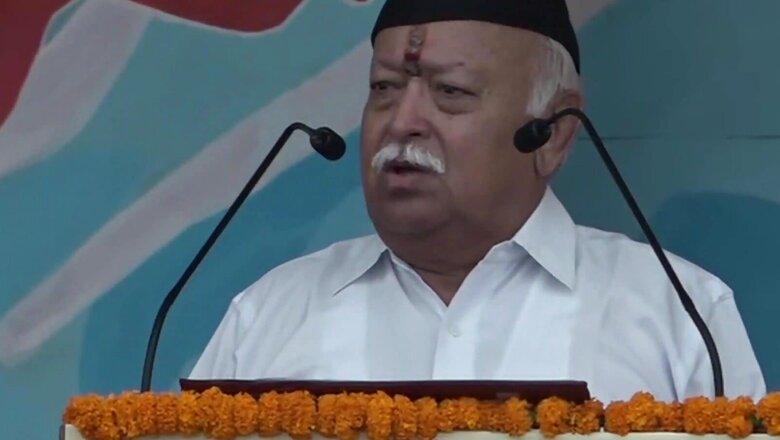
views
This was the 97th anniversary of the foundation of Rashtriya Swayamsevak Sangh (RSS), which was founded on the same day in 1925. In another three years, the RSS will be observing its centenary of existence. It is a record of sorts that a Hindu organisation survived and thrived for 100 years without ever splitting! From one shakha where 20-25 teenagers’ started coming together to play and do physical exercises in the presence of a middle-aged doctor to being a voluntary organisation that touches every dimension of our national life with 36 all India organisations and thousands of smaller regional and local organisations is a wonder of organisational genius. The RSS has brought Hindutva from the fringes to the centre stage of our national life.
Therefore, it is not surprising that the customary annual Vijayadashami address by the RSS chief is no more an address to the swayamsevaks of RSS but virtually an address to the nation. His views on this day used to set the path for the coming year for the volunteers of RSS, but now they are an indication of the direction that our national polity might take. This lecture provides some suggestions to society on how we can bring about the cultural renaissance of this nation. This is the reason Dr Mohan Bhagwat’s speech has created a kind of churn in the political sphere and the media.
Dr Bhagwat’s speech covered many practical aspects of economic issues, social issues like women’s empowerment, proper nurturing of the youth through New Education Policy to unleash their true potential and advice to Indians to be part of renaissance of the nation and the society, and not just expect the government to do everything. There can be no quarrel with the idea of Aatmanirbhar Bharat that is possible only with a strong economy and strong society made up of healthy citizens. So, he talked about a holistic preventive approach to health and not a curative approach.
A decentralised approach to economic development is also understood well that can empower citizens to lead a productive happy life. He also talked of social justice when he reiterated his vision of One Well, One Temple and One Cremation Ground for every village. He was not shy of accepting that lot is yet to be done to bring in social harmony.
He was clear that progress is possible for any society that accepts what is good from its traditional practices and gives up what is not in sync with the changing mores of the times, without compromising on its core cultural values. As he clearly pointed out that there are some issues on which there can be no compromise, that is Hindutva and ours being a Hindu Rashtra. Essence of the argument is that the inherent nature of our nation (Deendayal Upadhyay called it a nation’s Chiti) is Hinduness. We cannot achieve our destiny if we give up on our core values like inclusiveness, respect for all faiths and harmony with nature; economic policies that provide dignity and basic needs to the last person in the queue.
His observations that the negative narrative being created and unnecessary hurdles being put to stop our march to prosperous nationhood has raised many heckles. But what he has said is absolutely true. To quote Dr Bhagwat’s words, “Scare-mongering is done among so-called minorities that there is a danger to them because of us or organised Hindus. This has not happened in the past, nor will it happen in future. This is neither the nature of Sangh nor of the Hindus, history bears this out. Self-defence and defence of our own become a duty for everyone against those who spread hatred, commit injustice, atrocity, engage in acts of hooliganism and enmity towards society. ‘Neither threatens nor gets threatened,’ this kind of a Hindu society is a need of the present times. This is not anti-anybody. Sangh has a steely resolve to stand on the side of brotherhood, amity and peace.”
Stray stories are presented and magnified in such a way as if India was crime free and a peaceful country that had no communal riots till 2014. Beginning with fake stories of rape of nuns and attacks on churches, the opponents went on to foment hate by highlighting a few lynching cases but never talked about cow smugglers killing cow protectors in much larger numbers. Nor did they ever mention the hate crimes against Hindus where Hindu activists lost lives in hundreds in the same period. Negative narrative and urge to paint Bharat in a negative light can be seen from the demonisation of Narendra Modi that began in 2002 and it peaked before 2014 and never stopped after that.
The branding of the RSS as fascist with fakes stories of saffron terror and Hindu terror were planted in 2008 onwards. The nation has not forgotten the release of the book, RSS Ki Saazish (RSS Conspiracy) to put the blame of 26/11 on the RSS and letting Pakistan off the hook. People who hate the RSS and its philosophy fomented Hindu-Muslim divide even on the issues that had nothing to do with Indian Muslims like in the case of the CAA that led to 2020 riots in Delhi, or using an economic issue like Farmer Bills to create riots on 26 January, creating an artificial narrative of Muslim oppression in the name of ban on hijab which was actually an issue of uniform in a school — these are all signs of how the narrative of hate mongering and fear is being created.
Bhagwat’s efforts to reach out to those who have doubts about the RSS are being criticised without any rhyme or reason. In a democracy, conversations are the only way to sort out differences. He criticised the violence against Hindus.
To quote the RSS Sarsanghchalak again, “Critics of RSS may not use the terms Hindu or Hindutva. Words can differ but these are positions which cannot be compromised… the concept of Hindu Rashtra is being taken seriously. Many people agree with the concept but are opposed to the word ‘Hindu’ and they prefer to use other words. We don’t have any issue with that. For the clarity of concept — we will keep emphasising the word Hindu for ourselves.”
One must congratulate the Sarsanghchalak for bringing up the issue of population control and the need for a population policy about which no politician is willing to speak since the compulsory family planning fiasco by Sanjay Gandhi using state power during the infamous Emergency. But, how can we develop as a nation until we name the elephant in the room? No nation can provide basic amenities to all its citizens if it is going to produce an Australia every year. We can also not afford population imbalance, having suffered the most due to this population imbalance.
Dr Bhagwat rightly pointed out the examples of various countries that lost their geographies because of demographics. Bharat, of course, knows it well after losing 1/3rd of the land due to religious demographics. Despite the Nehru-Liaquat pact minorities in Pakistan and Bangladesh have suffered since the days of Partition. Most of the minorities have either been converted and killed; those who survive face persecution and are trying to escape to Bharat. Within Bharat, Kashmir is a living example about how Hindus can be driven out of their own land. Similar danger is clearly visible in Kerala, Bengal and Assam. We cannot delay a population policy anymore.
For the national renaissance to take place and for the nation to enjoy prosperity, we need a strong population policy. Demography can change geography. Unless there is population balance, the economic and social development we are talking about will have no meaning.
As anyone can see, this lecture is a positive statement of our roadmap to be a self-reliant, proud nation. Nor is there any doubt that without women’s participation as equals in this process of national reconstruction will not give desired results. You cannot have a developed and healthy nation without the building block of a happy family that will lead to a healthy society and hence the nation.
The RSS Sarsanghchalak, through his speech, has presented an integrated view of the issues that confront our nation and how to face them to fulfil the destiny that Supreme Being has blessed Bharat with. You can’t make economic progress if there is no peace within the society. You cannot have peace in society unless you face the truth — good or bad. In the complex interconnected world, one cannot have isolated problems and solutions. Everything is integrated and that is the Hindu worldview.
Nurturing this spark of life, that is our Hinduness, makes Bharat what it is, an unstoppable continuously flowing civilisation with its distinct character that unifies us all. That is Hindutva, the essence of Hindu dharma, our Hinduness. Therefore, this must be nurtured, that is the message.
The writer is a well-known author and columnist. He has written seven books on RSS and done a Ph.D. on RSS. The views expressed in this article are those of the author and do not represent the stand of this publication.
Read all the Latest Opinion News and Breaking News here










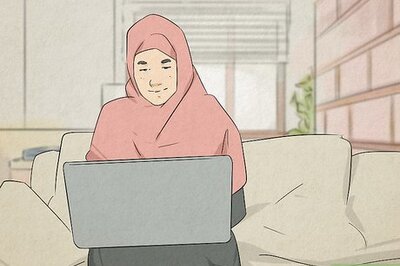
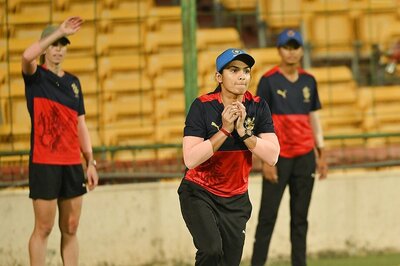

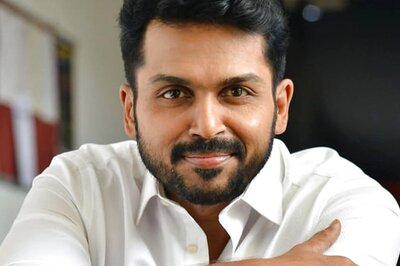

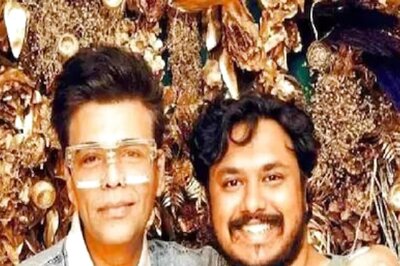



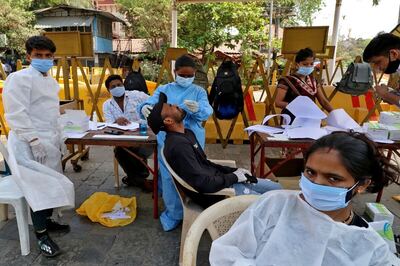
Comments
0 comment